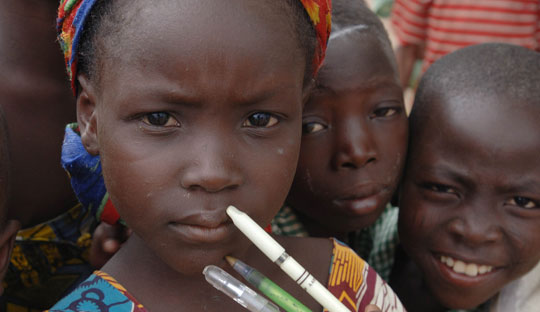The Millennium Development Goals have left behind millions of forgotten children. Had they tackled educational equality 9 million more children could now be in school in Nigeria and Pakistan alone.
A new report from the Global Campaign for Education UK, No Child Forgotten: Education and Inequality post 2015, states that the Millennium Development Goals (MDGs) have done too little to concentrate efforts on the poorest and most marginalized children. It recommends actions to address this when the world agrees a new development goals framework.
In 2000 the world agreed the MDGs, including a goal that all children should have the chance to go to school by 2015, and a goal to achieve global gender equality in education. However, this report shows that there was too little incentive to focus on inequalities and nothing about the quality of education.
Although big progress has been made – with 50 million more children now in school – of the 61 million children still denied their right to an education many are from disadvantaged groups; girls, the poorest, children living in disadvantaged areas and children with disabilities.
“It is vital that we focus on the most pervasive inequalities and that no child is forgotten, including those most at risk – youngsters with severe disabilities.” David Blunkett MP
David Blunkett MP and a speaker at the report launch said, “This time round we can’t make the same mistakes. As we get close to 2015 and work on a new strategy for reaching the goal of universal primary education, it is vital that we focus on the most pervasive inequalities and that no child is forgotten, including those most at risk – youngsters with severe disabilities.”
GCE UK believes that there is a huge opportunity for the British government and DfiD to lead the way and ensure that there is a greater focus on tackling inequality. DfID is a major donor to education globally, and with the UK’s commendable objective of spending 0.7% of national income on overseas aid from this year onwards, and David Cameron a Co-Chair of the UN Post-2015 High Level Panel, the UK is in a strong position to take this forward and influence other world leaders.
The report sets out a framework for the ‘post 2015 development framework’, the set of goals that will replace the Millennium Development Goals. It urges that assessment mechanisms are put in place to measure inequalities both in access to education and in the quality of learning outcomes.


 Send My Friend to School brings together thousands of children across the UK to speak up for the right to education.
Send My Friend to School brings together thousands of children across the UK to speak up for the right to education.